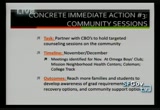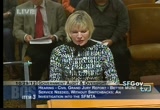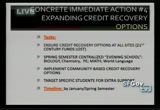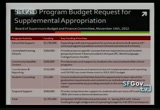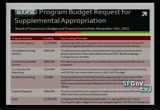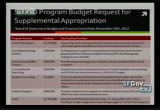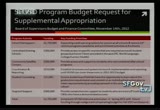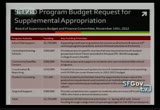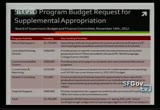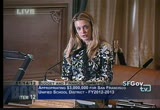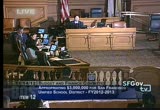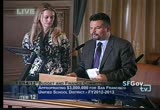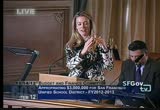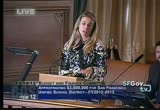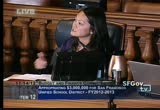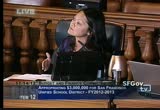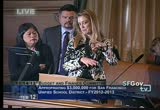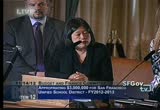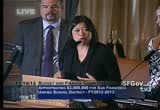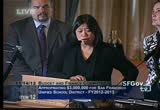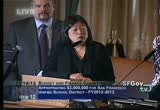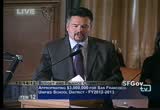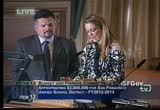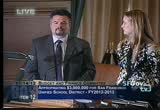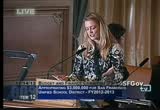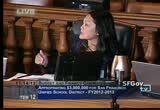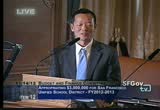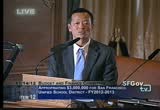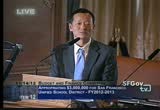tv [untitled] November 14, 2012 3:00pm-3:30pm PST
3:00 pm
club and >> welcome back everyone. welcome to the government audit and oversight committee. at this point madam clerk can you call item three and four. >> item three is a hearing and four is a resolution and to the investigation into the san francisco municipal transportation agency. >> thank you very much and back to the civil grand jury. thanks again. if you want to come up and we will hear item three. >> thank you very much supervisors. this time supervisor feral only about eight findings and recommendations. >> i made a good trade. >> yeah. and thanks for
3:01 pm
hearing about the san francisco municipal transportation agency and switchbacks and behalf of the grand jury and the chair of make the report and assisted in the report. >> thank you very much. >> thank you supervisors. i am sharon gadbury a member of the 2011-2012 grand jury and chair of the better muni service needed without sich backs report. i would like to thank chairman farrell and supervisor chiu and agencies for taking time to read and respond to our findings and recommendations. i want to thank you also the chemistry. we want to offer those to give the students that opportunity. we would like to partner with community organizations to take
3:02 pm
advantage of technology and some students using online options to have an option to work on their credit recovery online. that is web based for a lot of programs. at their community-based organization. we know that a lot of students like to hang out and give them a safe place to study. and they can do that off-site. we want to establish that infrastructure. and then we set another group of students that we want to be sure we provide extra support for. and an example of that, the last two summers we have been able to have summer school for the class of 2014. because dcyf has provided some funding for that. and we also at the same time worked with an organization of cbo called young community developers, and they worked with a group of our students. it was 50 the first summer, and i want to say close to 100 the second summer.
3:03 pm
and the outcomes for the students who went through the program were greater than the outcomes with the rest of the students. they had 90-95% class rate for their summer school classes. we want to give an opportunity to give a boost for these students through programs in the past, where we had measurable success. these are designed to increase
3:04 pm
the credit recovery options that we have at those schools. but also across all of our school. because right now the seniors, the ones that get priority. and we want to expand the options for the current juniors and younger. >> the loss of funding was 1.6 million and the request is for 1.73 to expand services now? >> correct. and then we also added, it's not just the credit recovery but in the budget sort of overview sheet sheeted -- sheet. there is $400,000 to continue enrichment programs such as clubs and debate club, some intermural things that happen after school we included in the request. the $300,000 is the centralized
3:05 pm
evening school to provide access to central courses and to have standardized location. and that is to establish three evening school sites across city at the high schools. $200,000 would be for the community satellite centers. to provide cbos for the technological need and the center set up and training. this is one time. the 150,000 is to hire two people to coordinate this. one specifically with online technology knowledge to make sure we get this implemented and implemented well. this would be positions that continue being funded by the school district. and as we go through our annual budgeting process. they would be allocated into that. so again this is one-time funding. the student counseling sessions are the extra boost we are doing
3:06 pm
right now around the community. extra outreach sessions with families for counselors to really focus on this group of juniors. the targeted support is again to give us a boost for this current class of juniors. who are the first to be hallowed to these graduation requirements. and to be sure that we have that extra support or the opportunity to give that extra support. like we had the opportunities in summer school. >> of this 2.7, which categories are one-time in nature? maybe you can just call out which ones were. >> there is the ideal world and the reality world. i think that the afterschool credit recovery. the largest bucket. >> which one? >> 1.7. that is something that we have relied on the 21st century
3:07 pm
grant. and we had good fortune to have that at the schools for enrichment and site specific credit recovery. as we move forward and don't get that for the next cycle of students and schools. we have to look at offering centralized evening school. we won't have it at all 16 comprehensive sites. but maybe offer evening school at six different sites. >> i apologize, 1.7 is ongoing and the remainder is one-time in natu nature? >> through the school system and budgeting process, we will have to budget for a centralized evening school. that would be ongoing, but the
3:08 pm
exact cost of that is probably double what we have in here. if we don't get the afterschool funding we will have to expand the evening options. so -- would the 1.7 be one time in terms of requesting it from the city, is that the ask? >> right. >> yes. because then the school district is going to have to determine how are they going to provide centralized evening school moving forward in a sustainable way. >> for the most part including the site report this sounds like a one-time request? i am sorry -- i think the question is really around. we are back-filling cuts that the school district has seen. these are previously funded
3:09 pm
activities that the school district has sustained over time. could you clarify in terms of what have is back-filling that need. versus what is one-time requests that don't need to be refunded again in the next fiscal year. by the school district or any other funding source. >> the specific things that were cut were 1.6 million from the 21st century after-school fund. the evening school. we would have evening school year round and this is one semester, and that was $600,000 that we spent on evening school, and that was a cut. in terms of the other amounts, those are more difficult to say directly related to cuts than overall. and we had to reduce things that we would have done with the school district. contract with the cbo and have
3:10 pm
counselors do more outreach. not more of a direct correlation. but definitely the 1.7 in the evening school is a doubling amount or the back-fill. >> thank you, perhaps that's not what i am getting at. there is a request of 2.7 million to do this work, some things are one-time in nature. but even if they are ongoing expenses that we can't back fill the school district. so the question is this one-time request. and asking this halfway through the school year. and is this expense for the half year or school year or what is the school's plan for this? >> this is for this year. some purchasing such as the
3:11 pm
online licenses don't expire. those are smart budget planners and purchase x amount of licenses and don't have to purchase next year. and focus the budget on the extra money for the teachers. >> good afternoon, deputy superintendent. i think that's a fair question. it is to help us address in the immediate our class of 2014 for this spring semester. i think you heard deputy superintendent lee describe our fiscal situation. and our task is how to deal in infrastructure and make up for the additional monies we have lost. like the 21st century monies and to be sure that there are opportunities for the students. and that's part of our task. and appealing for the funds and
3:12 pm
identifying others. >> the way that i look at it from my perspective of working intimately with our high schools. we passed a new graduation requirement that we believe in and want to be sure that our students have the opportunities. they make a choice whether they go to a uc system or different. we are not making that for them by limiting their course options. at the same time after we did that, there was this giant deficit we felt through the city -- through the state. then it was how we implement these new requirements while we experience these cuts. so school sites experienced it because they got less money than they had before. and why you heard some going from a seven to six-period day to make those choices to support their core program. they have all done these
3:13 pm
different cuts. and then we had the additional hit of what happened from the state with the after-school fund. because we weren't anticipating that. >> right. >> and i think that the school district eliminated evening schools that we still had that safety net. now we have an awareness and responsibility to reallocate and reprioritize in this new budgeting cycle. to be sure that we are meeting the needs of the students for graduation in the school district. i am not in a position to say 2.7 but to meet the needs. >> this may be a question more to young or the superintendent. which is to say that what we see before us is a supplemental request for $2.7 million. to provide additional funding so
3:14 pm
kids can catch up on credits and to do evening programs and after-school programs. and a host of other support areas. and that's what the request sounds to me. the two big questions i have, and this is for the superintendent is to say what is the school district's long-term plans for this, if this is indeed a priority? and to go backwards is this the school district's priority. we have a lot of requests from organizations that have received funding requests. and we are potential receiving sequestration cuts from the government. and the city has a desire to keep our reserves to deal with some unexpected issues. the concern i have, if the idea is that the city will continue to back-fill this year in and out. that's going to be a significant issue and problem. that's an expense that we don't
3:15 pm
have as a city. and the second issue, in terms of the funding, you had at the school district $50 million at the end of last year. $26 million in reserve you expect at the end of this current fiscal year. and $15 you need to keep in. if this is a priority why haven't the school board and district use that funding for this one-time purpose? as an individual who is watching for the city's funding. that's my concern. and a big question i have for the school district to answer. i don't expect you to answer the question but a response from the district. >> what i can say to the first point, we look at the funds and because of these unexpected cuts and because this class is the first graduating class. we look at this as a boost for the current students to
3:16 pm
graduate. the opportunities that opportunities before them had. and then in the meantime while we have this boost. then the school district needs to reevaluate its budget through the current fiscal year to prioritize you know our graduation requirements and reallocate the funding that they lot of. especially from the after-school programs. and that's where we are. that commitment to reallocate and make sure that the funds match the priority which is very much the graduation requirements. >> i appreciate that, and i think that school board member has something to add. >> thank you, that's a valid question and a good question. no, we are not asking the city to back-fill again on this really important issue. i think what happened, you heard that we implemented a higher graduation standard. and then we were cut $77
3:17 pm
million. i just want to assure you that we have appealed for our 21st century after-school funds. that appeal was denied this year, though we will appeal again. you are right we will have to make budget cuts that will serve these students next year. we don't expect to have these types of numbers in the coming year. we are instituting early warning benchmarks and assessments and indicators to show us where students are on track. we are learning actually from these two classes the supports that we eliminated during our budget crisis need to be reinstated. i think this budget, the next two-year cycle will look very different. knowing we have to budget for these students. as you know a-g when we voted
3:18 pm
in, in 2009. with high hopes that most students could meet this. but this meant also professional development for the teachers that were not used to teaching a lot of students chemistry. we for a long time gave students integrated science instead of chemist chemistry. as support you will not see these numbers again. and you be assured that we are not going to see these large numbers of students on track not to graduate. and we have made special accommodations for the english learners and they will be given extra opportunity so they can complete some of the courses. and have time to do the course work. we have been learning here. it's been a very hard lesson. we realize that we threw a lot
3:19 pm
of students under the bus, when we decided to cut summer school. not a decision that i voted in favor of. i thought it was not the right vote but i am one vote on the board. we know these are things that we have institute. the afterschool funding was crucial. the cut of it was criminal for the state to do that for us. we reach a lot of students during the summer school and in this after-school programming. we realize that it looks like it's a back-fill. and it looks as though we will come to you every year. but i want to assure you we have systems in place. we will not see these high numbers again. i think that all members at the school system were shocked to see these high numbers. we knew some students were not achieving but not in a
3:20 pm
year-and-a-half see 2,000 students not on track. and we know that education is a social responsibility for all of san francisco. that's why today we come to you with this request. we believe that high school graduation is the one determining factor for violence prevention in this city. and it's also who determines who will live here and raise a viable family in the 21st century. this is an opportunity that we reach out to you for these students, without your funding they will not graduate in the year 2014. deputy superintendent is here to answer any questions. >> okay, and then the other question i had, thank you very much for setting that background for us, i think that's helpful. the other question, given the fact that the school district has at the end of last year $50 million in reserves. and only $15 million is required
3:21 pm
to stay in the reserves. and knowing that at the end of this year you plan on $26 million in reserves. why at this time do you not allocate part of your reserves? >> part of our multi-planning at the end of next year we look at $59 million deficit. these cuts have taken a toll on the districts ability to meet its core mission and offer these additional sessions for this class. so we have to engage in another development budget cycle now that we have started early. but unable to upfront make that investment at this point. and why we are here now. >> but why would that be? i want to understand this. if you ask us to prioritize and pull our reserves for a cause we
3:22 pm
care about. why won't you put money into this cause. i guess i am asking this commitment that this school has. and we all see something in the future that we may have to make cuts for. >> right. >> i think that as bad the cuts have been and what i appreciate about meyung, though we have had to have furlough days we haven't had the numbers that other districts have had to have. and part of that is looking ahead to say if, we didn't have that for the next two years to use, we would then have to have furlough days that would limit our time as we are. as part of it from hearing him explain this across to the principals as well too.
3:23 pm
that when you look at out a three-year budget cycle what he's done is say, we need this amount to supplement, to even keep schools open for the number of days versus cutting. instead of having 1.5 furlough days this year, versus 10 furlough days like other districts. where i know a bunch of that is, but more details beyond that. >> thank you. >> thank you for your time and i want to see if anything you didn't cover in the presentation. >> i want to be sure in terms of our commitment to accountability. we have set dates when we could come back in progress in terms
3:24 pm
of student's grades aligned to the grading calendar. but happy to come back any time, monthly, like we do with our own school board with progress reports of number of students enrolled in classes and those types of things. and you see on the accountability slide. and those are the dates and we have grades in our system from the semester and the summer school. >> thank you. >> and the final slide is very important. because we look the at our past data and set performance metrics. and you see the numbers and the goals we have for those students based on prior expectations and what we have in terms of opportunities for students with credit recovery. you see what we expect in terms of holding ourselves accountable in reaching those targets. >> thank you very much, go you want to add something?
3:25 pm
>> yes, deputy superintendent lee is here now and very versed on our budget. >> this is the question we had earlier. i think it's a pretty simple one. i think one of the answers was given by your school board member who talked about the fact this is a one-time request. so she's answered that question. that was a question about the sustainability moving forward. the second question is if this is a school district top priority, and if it is, why doesn't the school district utilize those reserves to use for this. you are asking the city to tap into our reserves and we will be faced with sequestration and child care and we have competing needs. if you are asking the city to put in reserves to pay for this very worthy cause.
3:26 pm
that i think that the school district is saying is a priority. why won't the school district put in reserves as well? >> thank you, sorry i had to be out of chambers for a moment. but we have a significant priority on a-g. and hope everything you have heard from the sfusd team reinforces that. we have the 2014 group front and center in priorities in every respect and including funding. we have set aside funds in the 12-13 budget to help meet these targets. we can give you a report on the debatails of that. and in addition we think that in the coming years we will re-examining our budget for 13-14 and beyond to make sure we maintain the critical investments. i will say that one of the
3:27 pm
events which i think you have heard about is the loss of 21st century funds did come at a relatively late stage in this process. so the 21st century community learning federal grant which had been in place in eight schools. and several larger high schools that lost the grants are at risk not having after-school programs and including credit recovery offerings for the students. that came quite late. so we didn't have that knowledge in hand when we developed our budget for fy-12-13, and we will have to incorporate that plans going forward. we have a continuing budget deficit. so it's difficult to convey the concern that we have about the fact that we have $24-30 million in the next two years as a structural imbalance between our
3:28 pm
revenues and expenses. so this reserve it is true, we do have in excess of the 2% reserves that we are required to forestall state intervention. at the moment that is not going to be the case unless we make additional expenditure cuts. in that context it becomes challengeing to set aside additional funds on the spot. but in the future we have to invest in funds of a-g priority going forward. >> thank you, i think that the question is still outstanding about why the school district couldn't use the reserves. i understand the multi-year problem you face. i think that many jurisdictions do as well. but it feels not quite right that the school district is not putting in money to solve the problem, if the priority is there. and i am not hearing an answer
3:29 pm
as to why that can't be done. >> as i said, we can provide you a full report of investments we are making out of district resources. i hope we don't leave you with the impression that we are not investing district resources towards students meeting the a-g. >> that's not the concern that the school district is not putting in funds for the a-g requirements. but after this year you plan to have a $26 million reserve in excess of 2% requirement. and well is some funding left to tap into this issue if it's that big of a priority. and the question is why don't you, and maybe that's not an answer that you can answer at this moment. but it's something they am interested to hear about. supervisor kim youan
125 Views
IN COLLECTIONS
SFGTV: San Francisco Government Television Television Archive
Television Archive  Television Archive News Search Service
Television Archive News Search Service 
Uploaded by TV Archive on

 Live Music Archive
Live Music Archive Librivox Free Audio
Librivox Free Audio Metropolitan Museum
Metropolitan Museum Cleveland Museum of Art
Cleveland Museum of Art Internet Arcade
Internet Arcade Console Living Room
Console Living Room Books to Borrow
Books to Borrow Open Library
Open Library TV News
TV News Understanding 9/11
Understanding 9/11